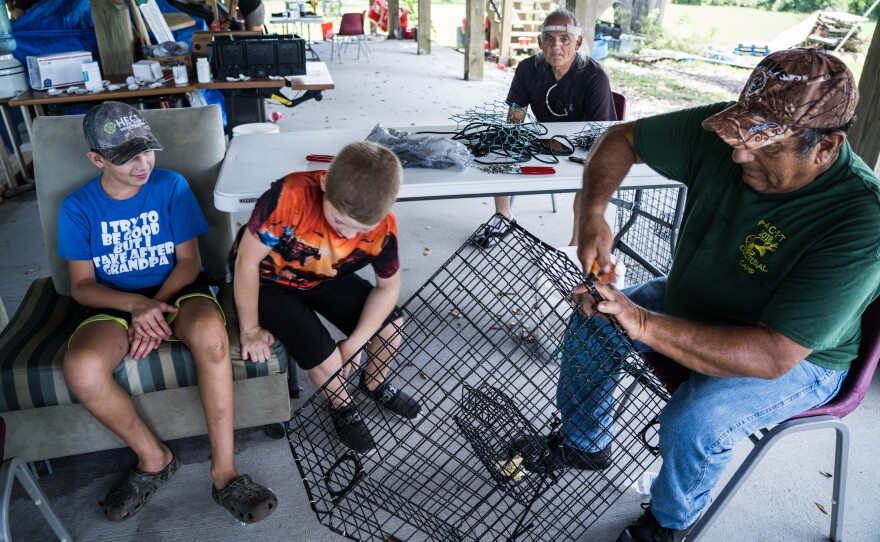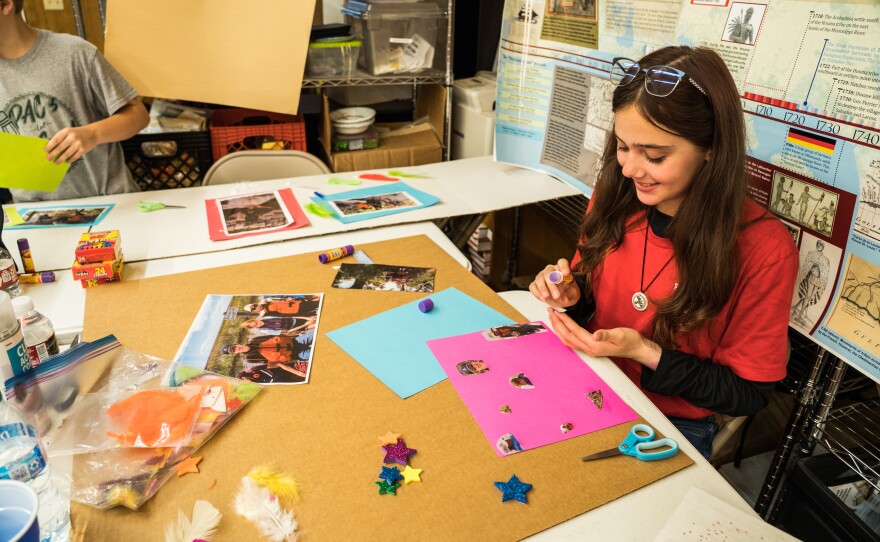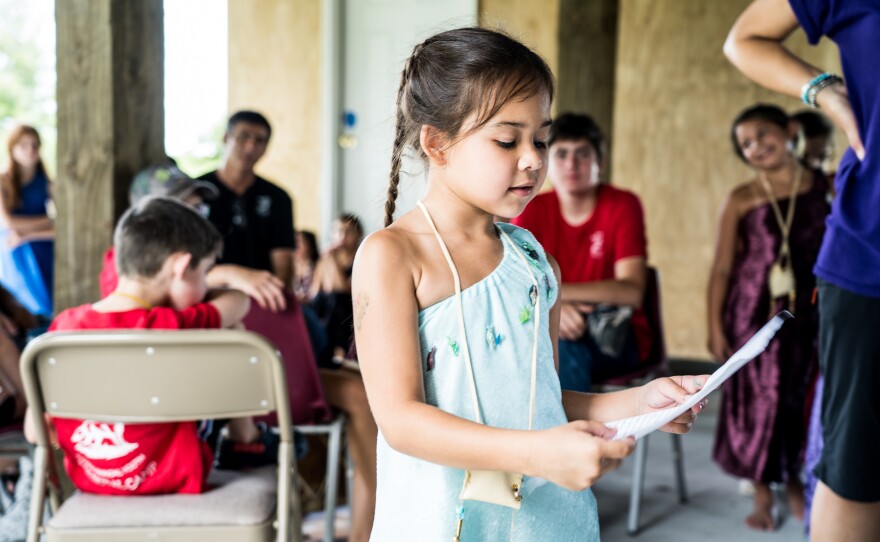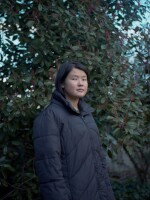In the humid Louisiana heat, three boats full of children and tribal members traveled down the bayou in Pointe-aux-Chenes to teach the Pointe-au-Chien tribe’s youngest members about their past, a 10-year-old tradition known as the Pointe-au-Chien Indian Tribe Culture Camp.
But in that decade, it’s hard not to notice their land, where over a century ago people were able to travel by horse and buggy to the barrier islands, is sinking away. Camp organizers Christine Verdin and Patty Ferguson-Bohnee pointed out the land loss, saltwater intrusion that has petrified trees and ancestral burial grounds nearly meeting the water, to campers.
Remnants of clear-cut canals left behind by oil and gas industry and hurricanes have exacerbated land loss within this bayou. Along with the rest of the Louisiana coast, the state loses about a football field of coastline every 100 minutes.
“It's very important that they understand what's going on in our community. That they understand the land loss, the flooding, the reason this is all happening, because as a child, I really didn't,” Christine Verdin said.
But how do you get 20 or so kids, ranging in age from eight to 15, to care about land loss? Christine Verdin said it helps when you can get them to care about the survival of their culture and history, the camp’s main goal.
In early July, when the week-long camp took place, children off on summer break came together at the Pointe-au-Chien Tribe building. Campers were engaged in hands-on activities that taught them about their history and culture: they made dresses adorned with gar fish scales meant for special tribal ceremonies, built their own medicine bags full of elderberry and willow, learned about local ecology and made plant cuttings to take home and share with family.
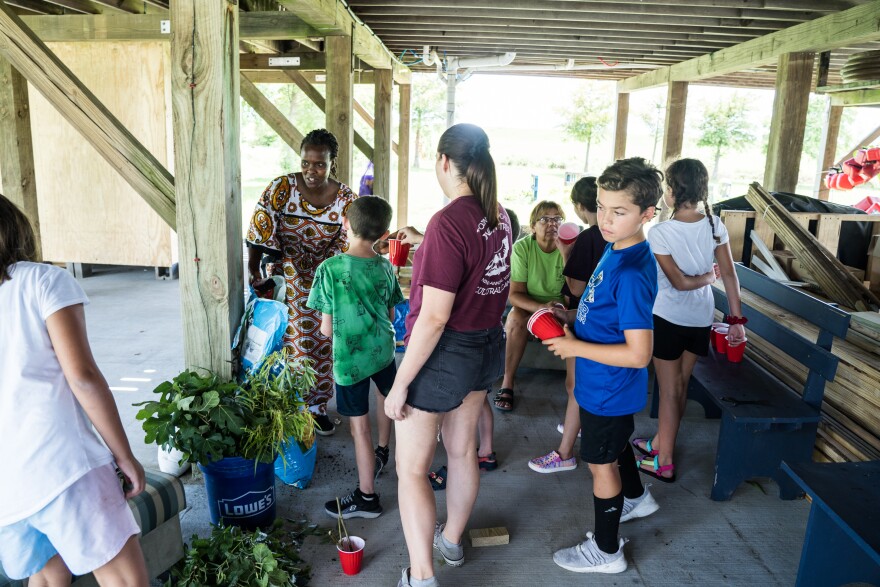
These activities are significant in teaching the campers about their culture because the Pointe-au-Chien tribe has utilized such materials that are local to the area for generations.
“It shows that as people, we didn’t waste,” Christine Verdin said.
Each camper introduced themselves, their family, and talked about what they enjoyed the most about camp at the end of the week to family and friends – in French.
The Pointe-au-Chien Indian Tribe is one of the oldest communities in coastal Louisiana, and they speak Indian French due to the consistent relationships built by the Indigenous community with francophones starting in the 17th century.
And speaking French has been part of their culture ever since, despite a history of discrimination toward students in Terrebonne who used the language. This year, the tribe is celebrating a victory by opening up their very own French immersion school and will teach K-4 students French in the shuttered Pointe-aux-Chenes Elementary School.
"It's awesome that some of the kids are able to speak French and not shy away from it,” Christine Verdin said.
The kids also had to learn how to sing the tribe’s song, which is in French and refers to their history as sugarcane farmers, shrimpers, hunters and deep-held connections they have to the area.
Their homeland is located in lower Pointe-aux-Chenes, and the tribe of nearly 800 members is descended from Chitimacha, Biloxi, Acolapissa and Atakapas Indians due to intermingling of different groups and the effects of European colonization causing movement through the Mississippi River Valley.
But their home, which sits above a warming Gulf of Mexico, is no stranger to destructive hurricanes, most recently devastated by Category 4 Hurricane Ida in August 2021.
The tribe is already involved in initiatives that hope to tackle land loss, and showing the kids these projects was part of the camp. On the boat ride, Christine Verdin showed the campers the living oyster coastline initiative that the tribe was able to take part in. The project, a partnership with the Coalition to Restore Coastal Louisiana and the Lowlander Center, helped maintain the shoreline even after Hurricane Ida caused significant damage.
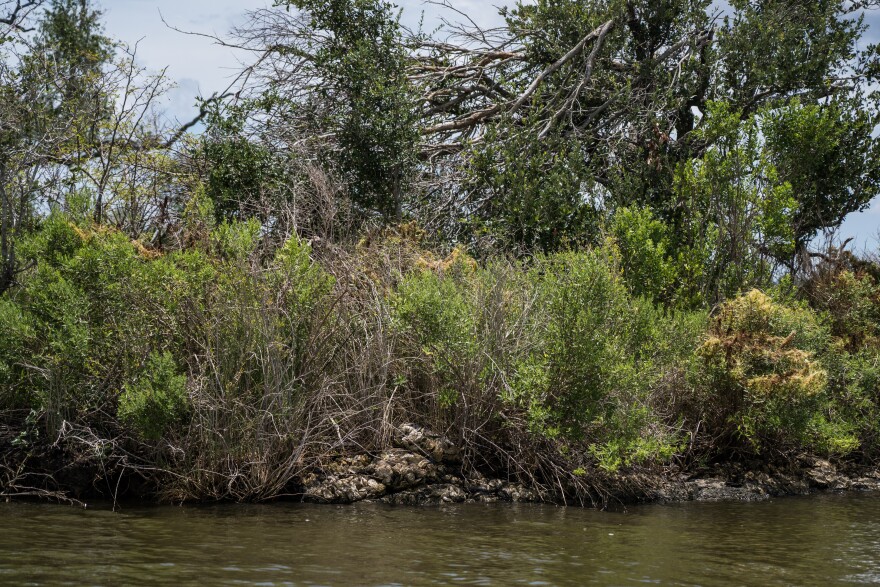
Christine Verdin pointed out the trauma that many kids faced after the hurricane season last year, and had a team called Louisiana Spirit at the camp to provide crisis counseling to help process their experiences.
“It lets them express some of the things they have been through. A lot of our kids are not back in their homes — they're living with family or they're living somewhere else,” Christine Verdin said. “They're living in FEMA trailers and camper trailers and go to different schools.”
On the boat, one camper, 8-year-old Alex Jolly, waved at her grandmother, little sibling and cousin as campers passed by a slew of FEMA trailers and her grandmother’s house, still with unfixed repairs almost a year after Ida.
“It’d be nice for things to go back to normal,” she said.
The boat also snaked through the bayou toward a patch of land with a large white cross marked with the name “Guillaume Billiot” at the center of a burial mound. It was the first time 9-year-old Braiden Bergeron had seen the place where one of his ancestors was laid to rest.

“I've actually never seen where any of my ancestors were. So it's kind of heartbreaking, just a little bit,” Bergeron said. “I would like this to continue with the culture camp and make sure that people keep coming to see what we’ve learned today.”
For 9-year-old camper Lexie Verdin, the camp was mostly an enjoyable time with friends, in which she got to paint oyster shells, take home crafts and make jokes in French with her other fellow campers.
But it was also a chance to reflect — on how her ancestors lived, and how much has changed from stories of her grandparents and parents growing up, particularly the landscape.
“It’s really sad to see the land breaking apart,” Lexie Verdin said. “What could originally be a grassy patch of land could slowly turn into open water.”

Lexie Verdin, who is related to Christine Verdin as Christine's father and Lexie's grandfather are brothers, said that as she grows up, she hopes to be a part of the solution to keep the land from disappearing.
“I’ll probably figure it out,” Lexie Verdin said.
For Christine Verdin, that’s the reason to continue holding this camp: to make them into advocates of their homeland.
“I don't want them to grow up not knowing why we've had so much land loss. And what's going to happen if it continues to be that way,” Verdin said. “Then maybe they could start advocating at a younger age than we were.”





